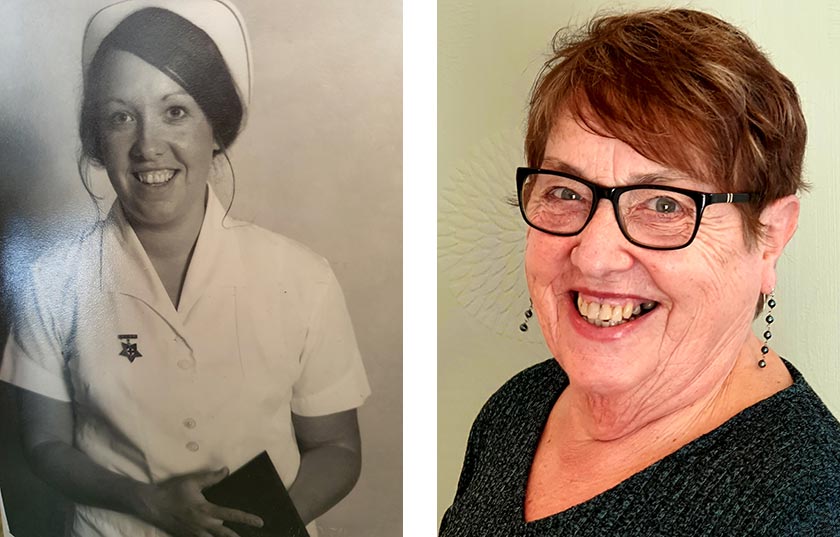Careers can be shaped by the strangest of events. For long-serving NZNO organiser Lyn Olsthoorn, the first steps in that career began when she attended a delegates’ meeting at Horowhenua Hospital to discuss roster problems. There she encountered a group of senior nurses knitting.
“It was quite a moment when I saw what the activists were doing. I thought ‘this is not really for me’ – I’d never knitted in my life. I realised no-one really cared about the rosters so I decided to ring an [NZNA] organiser.”
The organiser promptly told her she should become a delegate and it was that decision that paved the way for her organising career. Olsthoorn had trained at Wellington Hospital, graduating in 1974. “I can’t honestly say I always wanted to be a nurse but I’m very glad I did because I’ve had a wonderful career.”
After working in a surgical ward at Wellington Hospital for three years and some “OE”, she moved with her husband to Levin. While a delegate at Horowhenua Hospital, she took part in the first national nursing strike. Members picketed outside Labour MP Judy Keall’s office – “I loved every minute on the picket line”.
Sole organiser role
She subsequently became chair of the regional council and, in 1990, the organiser who had first encouraged her to become a delegate encouraged her to take a job as an organiser in the about-to-be-opened Palmerston North office. She became the sole organiser covering Whanganui, Manawatu and Hawkes Bay. Two days’ orientation in Wellington saw her meet another new organiser, Glenda Alexander. “We went out for lunch and were a little late back. The educator told us if we were not going to take the job seriously we would not survive at NZNA.” Thirty years on, the educator’s prediction has been proved spectacularly wrong.
She remembers the ’90s as the era of the Employment Contracts Act (ECA) – the end of national awards and the growth of individual employment agreements; the jobs of senior nurses, including up to assistant matrons, “going down the gurgler”; closures of rural hospitals and a never-ending procession of management-of-change processes.
The ’90s politicised many nurses. With the 1993 amalgamation of NZNA and the NZNU to form NZNO, Olsthoorn was joined by an organiser from NZNU, Denise Stevens, and in 1994 by Craig Walsham. That was the beginning of continued expansion of NZNO’s membership and staff numbers. There are now 12 people, including six organisers and a lead organiser, in the Palmerston North office.
The following decade saw a Labour-led Government replace the ECA with the Employment Relations Act. This enabled the rebuilding of national coverage of public sector nurses, through the development of regional multi-employer collective agreements (MECAs). Olsthoorn’s responsibility was to bring together contracts from multiple sites, including seven DHBs. Twelve collective contracts were consolidated into the Lower North Island MECA. In 2004, all regional MECAs were brought together into the inaugural national MECA.
Continued underfunding of health, and job and service cuts have been a feature of her work over the last decade.
Despite the relentless and, at times, unappreciated nature of the organiser role, Olsthoorn has loved its variety, the chance to learn something every day and the joy of seeing members make a difference. “I have got enormous job satisfaction from seeing the difference the union makes and how members can make a difference. And, more latterly, I’ve loved mentoring new organisers.”
But there have been dark sides to the role. “I’ve witnessed some very difficult situations, where people have lost their jobs through no fault of their own. I’ve seen horizontal violence destroy people. Sadly it has always been a part of the nursing workforce but now another site has opened up – social media. Keyboard warriors attack colleagues without having any idea of, or care about the consequences. Horizontal violence still occurs in the workplace, but is more overt and there are systems in place to deal with it. Its transference to social media is frightening and Nursing Council must have a role in monitoring it.”
A situation that will always haunt her is when some caregivers asked for her help. “I met them at the back door of the rest home. They opened a rubbish bin filled with urine-soaked newspapers – incontinent residents had newspapers instead of linen. We challenged the employer, who eventually closed the rest home.”
Olsthoorn would like NZNO to refocus on organising, which she believes will, in turn, rekindle greater member activism. “The belief that organising is our reason for being seems to have been diluted.”
While a little anxious about retirement initially, she is now looking forward to a different kind of life. “I know it will take some time to adjust. I’ll miss the people contact and the day-to-day challenges but they will be replaced by other interests.”
Those other interests include her passion for roses, piano and saxophone lessons, refugee resettlement and – most importantly and COVID-19 permitting – spending more time with her Australian and European-based grandchildren.



